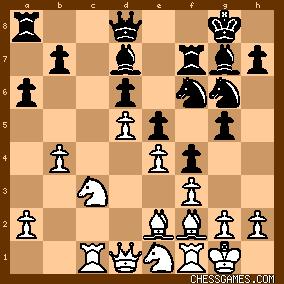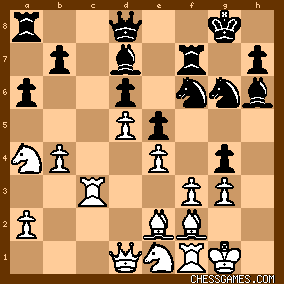| Jan-23-05 | | siggemannen: 11.Be3 is probably the best test of black's position, instead of old 11.g4 |
|
| May-09-09 | | jerseybob: 20.g3 has got to be a lemon. Maybe 20.fg followed by Nf3 would've been better, or maybe 20.Nb6 first. In the end, Berger wins the pawn, Reshevsky the king, while the white knights watch it all from far off. |
|
| Feb-03-21 | | Gaito: One of the first critical moments of the game was reached after Black's 18th move (18...Bd7) (see diagram)

click for larger view
The engines (Stockfish 12 and LcZero) judge the position as equal, and suggest the move 19.Kh1. But Berger played 19.Na4?, a move that is not endorsed by the engines, on account of Black's breakthrough 19...g4! (computer evaluation: -1.50) It is clear that Black's attack on the K-side will come much faster than any possible offensive by White on the Q-side. The white knight on a4 is headed for the square b6, but meanwhile Black is gathering an accumulation of his forces with a view to undertaking a K-side offensive. After 19.Na4? g4! 20.g3? White violated one of Steinitz's basic principles: "Do not create weaknesses on the side where your opponent is attacking". We don't know if Reshevsky was pressed by the clock (as usual), but after 20.g3? he missed a chance to play the immediate 20...Bh6!, which is very strong according to the engines; anyway he played that bishop move after 20...fxg3?! 21.hxg3 Bh6! The computer already points out that Black is winning (evaluation -2.39). Further, there followed 22.Rc3, and the following position was reached:

click for larger view
BLACK TO PLAY
According to the engine (Stockfish12), Black has the winning scrifice 22...Nf4! which is very strong and has a high computer evaluation in Black's favor. However, it is not a simple move, or at least not a "human" move, but a typical engine move. It leads to great complications in Black's favor. A sample variation: 22...Nf4! 23.gxf4 g3! 24.Bb6 Qe8 25.fxe5 Bxa4 26.Qd3 dxe5, and according to the engine, "Black has a winning advantage".
Reshevsky played the more "human" move 22...Bb5?!, but according to the computer, Black lost thereby all his previous advantage, and the position became again equal after 23.Nb6 Rb8 24.Bxb5 (better was 24.a4 =) axb5 25.Qe2. |
|
| Feb-03-21 | | Gaito: After 30.Kh1 the following position was reached:

click for larger view
BLACK TO MOVE
The engine again suggests a sacrifice on the square f4, but this time the sacrifice of the bishop: 27...Bf4!?, which is unclear, and again a typical "engine move", not a "human move". Reshevsky played the more "human" move 30...Ng4?! which the computer doesn't like, on account of the reply 31.Nc4! after which "White is winning", according to the engine (computer evaluation: +2.44). But good players are often lucky (as Capablanca used to say), and Reshevsky was lucky that White did not play 31.Nc4!, but blundered with 31.Bg1??
After that blunder, Reshevsky was again on the driver's seat and played the strong 31...Nf4!, which has a comouter evaluation of -5.16. The rest of the game was child's play for Reshevsky. |
|
|
|
|





